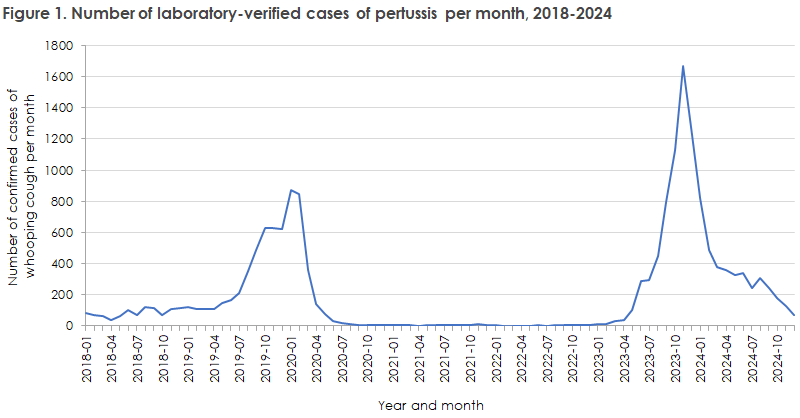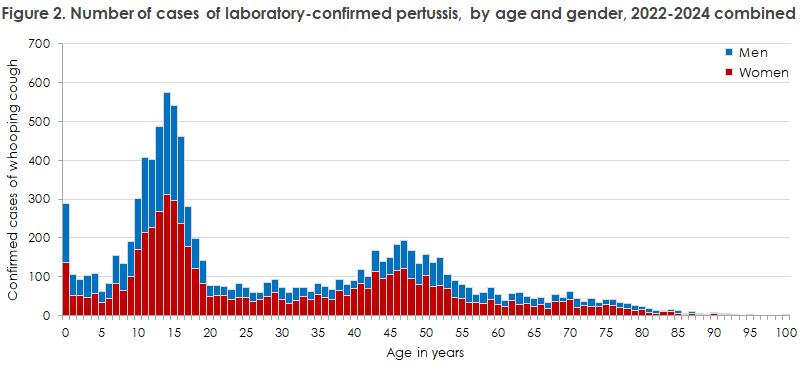No 18 - 2025
Whooping cough 2022, 2023 and 2024
Whooping cough 2022, 2023 and 2024
- 54, 6,058 and 3,890 cases of pertussis were confirmed by laboratory analyses in the years 2022, 2023 and 2024, respectively.
- In those three years, a single infant death due to pertussis was registered in 2023.
- There was a pertussis epidemic in 2023, but it faded during the spring of 2024. The epidemic affected the entire country. The latest epidemic before 2023 was in 2019.
- In the period 2022 to 2024, pertussis was seen among all age groups, especially among children < 1 year, among older children (approx. 10-18 years) as well as among adults in their forties. 58% were among women.
- Vaccination against pertussis is recommended at the age of 3, 5 and 12 months, at 5 years as well as during pregnancy (pregnancy week 24-32).
- Neither vaccination nor an episode of pertussis provides lifelong immunity against pertussis.
- Pertussis is individually notifiable for children < 6 years, and the child's physician completes the notification electronically.
- Furthermore, pertussis is notifiable for all cases confirmed by laboratory analyses. This is automatically done via MiBa.
Pertussis (also known as whooping cough) is a respiratory infection caused by the bacterium Bordetella pertussis. Pertussis can be life-threatening for infants, and vaccination against pertussis has therefore been a fixed component of the Danish childhood vaccination program since 1961. Similarly to other diseases we vaccinate against in Denmark, the occurrence of pertussis is closely monitored. In the annual report for pertussis 2022-2024, the incidence of pertussis is described in detail for the latest three calendar years.
Normally, approximately 1,000 cases of pertussis are confirmed per year in Denmark. In 2019 there was an epidemic, where the total number for the year reached 3,691 cases. In March 2020, measures were introduced to reduce the spread of infection with COVID-19, and this also proved to have a significant effect on the spread of other respiratory infections, such as pertussis. The pertussis epidemic therefore quickly disappeared, figure 1. In the spring of 2020 through spring 2023, the incidence of pertussis was still unusually low, but a strong increase in early summer 2023 developed into an epidemic that affected the entire country. During 2024, the epidemic stopped, and pertussis settled down to a normal level again. Epidemics with pertussis typically occur every 4–5 years, as is also seen in other countries.

Pertussis is not just a childhood disease, but rather an infection that can affect individuals of all ages. Pertussis vaccination or a pertussis illness do not provide lifelong immunity, therefore it is possible to get pertussis multiple times throughout one’s life. Pertussis is extremely contagious in the first 3–4 weeks of the illness, and the entire course can last up to 3 months. In the described period from 2022 to 2024, there was an increased occurrence among children < 1 year, among older children aged 10 to 18 as well as among adults in their forties, figure 2.

Small children can receive their first vaccine against pertussis when they are 3 months old. To protect them as best as possible against getting pertussis until they are old enough to be vaccinated themselves, it is recommended that pregnant women be vaccinated during pregnancy. In 2024, 52% of pregnant women were vaccinated against pertussis to protect the infant. A recent Danish study has shown that pertussis vaccination of pregnant women is both safe and effective.
After a period with low pertussis incidence during COVID-19, the number of cases rose significantly in 2023, before it again fell in 2024. Pertussis can affect all ages, since immunity is not lifelong. To protect infants as best as possible, vaccination of pregnant women is recommended in each pregnancy.
(T. Dalby, L. Hallundbæk, P.H. Andersen, Infectious Disease Epidemiology and Prevention)
April 30, 2025